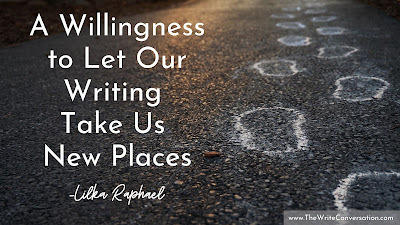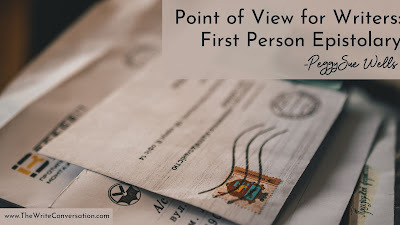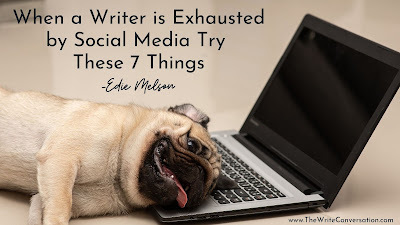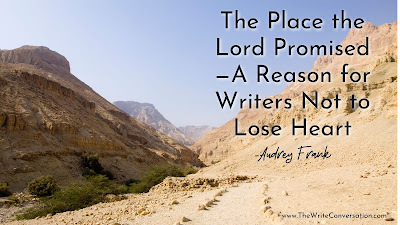Edie Melson's Blog, page 43
August 11, 2024
Why and How Writers Should Stay Plugged Into Community

by Larry J. Leech II @LarryJLeechII
When I wrote this blog, I sat by myself in the local Starbucks where all the baristas know me as a regular. But few know what I do for a living. And that’s okay. Although great people, they are not my community. I simply go to the branch office to ‘work.’
Most days that entails going off in my own little world to edit or write. But doing so day after day is not good for me. I need connections, community.
Back in the day, yes, I am old enough to remember those days, being connected with other writers took a lot more work. Phone calls, snail mail, and in-person conferences were our only options.
Today, the choices are many—email, direct messaging on numerous social media accounts, video chat, online writers’ groups, in-person writers’ groups, and perhaps an accountability partner. There are probably a few I’ve forgotten or haven’t used.
I need my writer friends, my church friends, my recovery friends. Each community helps keep me focused and grounded in every aspect of my life. We were made for community. Hebrews 10:24–25 (NLT) says, “Let us think of ways to motivate one another to acts of love and good works. And let us not neglect our meeting together, as some people do, but encourage one another, especially now that the day of his return is drawing near.”
God knew we would function better if we were in community with others—church, building a house, writing, organizing and hosting a conference, recovery, anything. We need each other—in all that we do.
Over the years, these three practices have helped me keep in touch with my communities.
3 Ways to Stay Connected with Other Writers
One, make an effort to stay connected. I used to wait for others to reach out to me. Now, when someone comes to mind, I take a moment to type out a quick email or text.
Two, find a writers’ group or an accountability partner. I’ve belonged to three groups since 2001. I’ve said and written this numerous times over the years: I wouldn’t be the writer I am today without my writers’ group even though I was near the tail end of a 23-year journalism career when I joined my first group. The group I’m in now tries to meet once a week. Whether we meet or not, we stay in touch via our group text, and not just about writing concerns or questions. We often send out prayer requests. Being an accountability partner, or having one, doesn’t take up much time. When I’m an accountability partner, I ask the person to send me a word count on Friday for their effort that week. That’s it. No critiques. No feedback. Just a word count to ensure some kind of progress.
Three, while you work on a project, ask a handful of people to pray for you. If the prayer needs change, don’t hesitate to alert them. When prayers are answered, update the group as well. Intercessors love to know when their efforts bear fruit.
These things have helped me over the years. Maybe they’ll help you as well, so you don’t have to trudge along all by yourself. If you have things that have helped you, I’d love to hear about them.
TWEETABLEWhy and How Writers Should Stay Plugged Into Community from @LarryJLeechII on @EdieMelson (Click to Tweet)
 Editor-in-Chief at Bold Vision Books and writing coach of award-winning authors, Larry J. Leech II has spent more than forty years writing and editing. He started his career as a sportswriter in southwestern Pennsylvania where he covered prep, college, and pro sports, including the Pittsburgh Pirates and Steelers.
Editor-in-Chief at Bold Vision Books and writing coach of award-winning authors, Larry J. Leech II has spent more than forty years writing and editing. He started his career as a sportswriter in southwestern Pennsylvania where he covered prep, college, and pro sports, including the Pittsburgh Pirates and Steelers. In 2004, after 2,300 published articles, Larry moved into the book publishing industry. Since that time, he has ghostwritten 30 books, edited more than 400 manuscripts, and coached hundreds of authors through the writing and publication process. You can find him online on Twitter, Facebook, and Instagram.
Published on August 11, 2024 22:00
August 10, 2024
Writer, Don’t Get Too Comfortable

by Martin Wiles @LinesFromGod
One of my grandsons is a pensive tike—even more so as he nears puberty.
My daughter has always sent us comical and serious things our grandsons say. One day, after this one read his devotion, he entered the den and said, “Mom, the devotion today was about John the Baptist. Now, I don’t think we have to move to the wilderness, but I don’t think we should be too comfortable.”
Reading about John, I don’t think I would get too comfortable with his lifestyle: “John’s clothes were woven from coarse camel hair, and he wore a leather belt around his waist. For food he ate locusts and wild honey” (Matthew 3:4 NLT).
Smart kid, my grandson. At eleven, he has things figured out spiritually. I just hope he remembers this as he ages and the temptations increase.
Most of us love stuff. As I write this, Amazon Prime Day began the day before. Deals popped up on every device we opened. Good deals. But the thing was, we didn’t need what most of them offered.
Jesus pegged a balanced life when he said, “’And you must love the Lord your God with all your heart, all your soul, all your mind, and all your strength.’ The second is equally important: ‘Love your neighbor as yourself.’ No other commandment is greater than these” (Mark 12:30-31 NLT).
One of the proverbs also says it well: “Give me neither poverty nor riches—Feed me with the food allotted to me; Lest I be full and deny You, And say, ‘Who is the Lord?’ Or lest I be poor and steal, And profane the name of my God” (Proverbs 30:8-9 NKJV).
God doesn’t take issue with us enjoying the things he has created. And, admittedly, we writers love stuff: computers, Mac books, iPads, earbuds, pens, pencils, paper, notepads, apps, calendars. We also tend to love our favorite genres and stick to them when writing. That’s not all bad. After all, we write best when we write about what we know.
However, moving out of our genre—at least temporarily—or writing about something we know little about provides an opportunity to stretch our craft and our minds. When we get too comfortable where we are, we stagnate, like a water source with no inlet or outlet.
But we must also monitor our comfortableness with the tools of our trade. We can focus on the trees and miss the forest. The stuff begins to own us instead of us owning the stuff. The writing play toys turn our attention to play time, leaving us little or no time to use them to do what God called us to do: write.
My grandson was right. God doesn’t want us to get too comfortable—in our spiritual or writing lives. He knows when we do, our priorities tend to slip or jumble up—like the rich man in one of Jesus’ parables whose crops produced abundantly one year. He planned to build more barns, sit back, and enjoy a long life. God reminded him that life was short. We never know when it will end. And we never know how many more writing opportunities we will have.
So, no, we don’t have to move to the wilderness or become extreme minimalists. I don’t have to sell my laptop and iPad and return to handwriting or typing devotions, articles, and books and then sending them by snail mail. Yet, we must balance the physical, spiritual, emotional, writing, and familial aspects of our lives and, at the same time, avoid getting too comfortable with any one of them.
Our sole purpose is to do what God created us to do in our lifetime. And he will give us whatever we need to accomplish his plan. For John the Baptist, it was locusts, wild honey, and camel hair garments. I hope it will be a little more than that for me.
As my grandson said, “God doesn’t want us to get too comfortable.” After all, life is too short.
TWEETABLEWriter, Don't Get Too Comfortable from Martin Wiles (@LinesFromGod) on @EdieMelson (Click to Tweet)
 Martin Wiles is the founder of Love Lines from God (WWW.LOVELINESFROMGOD.COM) and serves as Managing Editor for Christian Devotions and Directing Editor for VineWords. He has authored six books and has been published in numerous publications. His most recent book, DON'T JUST LIVE...REALLY LIVE, debuted in October of 2021. He is a freelance editor, English teacher, author, and pastor.
Martin Wiles is the founder of Love Lines from God (WWW.LOVELINESFROMGOD.COM) and serves as Managing Editor for Christian Devotions and Directing Editor for VineWords. He has authored six books and has been published in numerous publications. His most recent book, DON'T JUST LIVE...REALLY LIVE, debuted in October of 2021. He is a freelance editor, English teacher, author, and pastor.
Published on August 10, 2024 22:00
August 9, 2024
What Risk Do You Need to Take with Your Writing Today?

by Beth K. Vogt @BethVogt
“I wish I had taken a risk. You have everything to win and nothing to lose.” Elise Cranny (1996-), American Olympian, middle and long-distance runner
I watched the Olympics as I wrote this blog, specifically the Women’s 5000m, where American middle- and long-distance runner Elise Cranny competed in her second Olympics.
As the elite female athletes competed, one of the commentators talked about Cranny’s previous Olympic performance—specifically how she said, “I wish I had taken a risk. You have everything to win and nothing to lose.”
Would Cranny do it this time? Would she take a risk on that purple track in Paris?
A few moments after I wondered what Cranny would do, she made her move, attempting to catch up with the race leaders. She matched their pace for a while, and then the frontrunners once again moved ahead of her. Ultimately, Cranny placed eleventh overall.
Yes, she took that risk.
No, she didn’t win.
Was the risk worth it?
Absolutely. Cranny ran to win.
Writers, when’s the last time you took a risk?
Maybe your biggest risk today is to show up and keep writing. Choose to persevere when you’re tired, when your story’s not working, when your word count is way-less than what you’d planned on by this time. You’re not guaranteed things will get easier, but you put forth the effort no matter what the outcome.
Maybe your biggest risk today is to celebrate who you are as a writer. Step away from the comparison trap. Take a moment and recall your strengths as a writer. Better yet, write them down. Are you good at crafting dialogue? Can you pen a strong devotional that ministers to others? Are you undaunted when it comes to developing a synopsis? Today’s the day you step back and applaud your strengths.
Maybe your biggest risk today is to finish what your started. Finish that manuscript—which happens one word, one sentence, one scene, one chapter at a time. Finish that proposal. Finish that pitch. Toss the word “perfection” out the door and aim for completion. Rewriting is always part of the writing game, but first you must finish whatever you’ve been working on.
Maybe, my friend, you just need to finish today holding onto hope. Sometimes that’s the biggest challenge we face: Finishing today believing we can get up tomorrow and begin again. As writers, we’re always balancing the challenges in our real life with the challenges we face in our writing life.
I hope you share in the comment section what risk you’ve taken lately—or what risk you’re taking today. Go ahead, take that risk. Remember: You have everything to win and nothing to lose! I’m cheering you on!
TWEETABLEWhat Risk Do You Need to Take with Your Writing Today? @BethVogt on @EdieMelson (Click to Tweet)
 Beth K. Vogt believes God’s best often waits behind the doors marked “Never.” She’s authored 15 novels and novellas, both contemporary romance and women’s fiction. Beth is a Christy Award winner, an ACFW Carol Award winner, and a RITA® finalist. Her newest contemporary romance novel, Dedicated to the One I Love, released June 20, 2023. Her novel Things I Never Told You, book one in her Thatcher Sisters Series by Tyndale House Publishers, won the 2019 AWSA Golden Scroll Award for Contemporary Novel of the Year. An established magazine writer and former editor of the leadership magazine for MOPS International, Beth blogs for Learn How to Write a Novel and The Write Conversation and also enjoys speaking to writers group and mentoring other writers. She lives in Colorado with her husband Rob, who has adjusted to discussing the lives of imaginary people. Connect with Beth at bethvogt.com.
Beth K. Vogt believes God’s best often waits behind the doors marked “Never.” She’s authored 15 novels and novellas, both contemporary romance and women’s fiction. Beth is a Christy Award winner, an ACFW Carol Award winner, and a RITA® finalist. Her newest contemporary romance novel, Dedicated to the One I Love, released June 20, 2023. Her novel Things I Never Told You, book one in her Thatcher Sisters Series by Tyndale House Publishers, won the 2019 AWSA Golden Scroll Award for Contemporary Novel of the Year. An established magazine writer and former editor of the leadership magazine for MOPS International, Beth blogs for Learn How to Write a Novel and The Write Conversation and also enjoys speaking to writers group and mentoring other writers. She lives in Colorado with her husband Rob, who has adjusted to discussing the lives of imaginary people. Connect with Beth at bethvogt.com.
Published on August 09, 2024 22:00
August 8, 2024
A Willingness to Let Our Writing Take Us New Places

by Lilka Raphael @Lilka_Raphael
Anyone who has never made a mistake has never tried anything new -Albert Einstein
Staying in one lane is crucial when driving, however it is counterproductive when exploring our potential as a writer. As there are multiple facets to our personalities, there are probably more than a few distinct writers within each of us. Pushing past the familiar not only stirs our creativity but can unearth hidden talents as well. There comes a time when it may be appropriate to shift gears and veer off into another direction. I learn something every time I research scripture for a devotion. However, there are also multiple storylines running through my head. Though nonfiction is my priority, I am curious to see how this long simmering story unfolds.
Many of us are reluctant to try anything new especially when we have established ourselves in a particular genre and navigate it with ease. Yet how can we expand our creativity, talents, and influence if we do not occasionally remove the boundaries and see where the path leads? What if writers block is not an obstacle but a detour to a different destination?
It is impossible to learn new skills if we never stretch ourselves or listen to our inner voice that prompts us to try something different. I’ve been amazed by what comes out when I allow my mind to wander as my fingers follow along on the keyboard. I never considered myself a poet but made a halfhearted attempt at the request of someone else. Some of it was pitiful. Other ramblings contained a seed to nurture. And then there are times I looked back at the computer screen and thought, “not bad.”
As writers we corral and choreograph the words on the page. Perhaps, there are times when we should follow the words and see where they take us. Allowing our guard rails to fall and creativity flow can liberate our inner detective, or comedian. As with any profession, stagnancy rarely produces innovation. Our evolution as writers may take many turns along our journey. Daring to wander through the unknown and see where the path leads allows us to evolve and find unprecedented ways to connect with our readers.
Our willingness to wander through genres can also improve our primary topic matter. Nonfiction is far more engaging when fiction techniques are utilized by the author. The artistry of a poet can rejuvenate a staid drama. Do not allow your comfortable writing routine to leave no room for clever ideas and concepts. Just because it has never been done before does not mean you can’t do it. The most iconic figures in literature and pop culture all emerged from novel ideas.
If you find yourself at a loss for words, consider meandering into the unknown. You may discover hidden talents you never imagined.
Behold, the former things have come to pass, And new things I declare; Before they spring forth I tell you of them. Isaiah 42:9 NKVJ
TWEETABLEA Willingness to Let Our Writing Take Us New Places from @Lilka_Raphael on @EdieMelson (Click to Tweet)
 A Florida native, Lilka Finley Raphael has been a licensed pharmacist for over thirty years. Her passions for writing, gardening, and photography prompted her to share her experiences and life lessons on her blogs B Is for Blessed and God, autism, & me. You can learn more about her at lilkaraphael.com
A Florida native, Lilka Finley Raphael has been a licensed pharmacist for over thirty years. Her passions for writing, gardening, and photography prompted her to share her experiences and life lessons on her blogs B Is for Blessed and God, autism, & me. You can learn more about her at lilkaraphael.comLilka’s greatest achievements are her two adult sons who have flown the nest. Happily married for thirty-two years, she lives east of Atlanta with her husband, Rod. They now share their home with two German Shepherds—Holly and Ivy—and one naughty kitty, Moxie.
Published on August 08, 2024 22:00
August 7, 2024
When a Writing Conference Just Isn’t Meant to Be

by Julie Lavender @JLavenderWrites
I look forward to writing conferences every year. Once I started attending regularly, I was hooked. I love the fellowship of other Christian writers. I like hanging around people who speak the same publishing language I do. I love getting the most recent industry news from well-published authors, editors, agents, and other professionals.
I love the motivation a writers’ conference stirs in my heart and brain. The encouragement and support an attendee receives at a conference is hard to fathom until you’ve actually experienced it. From one conference to the next, whether I received a couple of rejections, got discouraged about a project, or finished a project that was accepted and published, each conference brought cheerleaders to celebrate with me or push me to continue striving toward my goal.
Sometimes though, life happens, and God’s plans steer us in a direction that doesn’t involve writing conferences. Often these are difficult situations, like a health challenge involving us, our children, or our parents. Sometimes financial constraints keep us away. Other times, joyous occasions, like a wedding or a vacation interfere with our conference time.
At the beginning of 2024, I pulled out my calendar and penciled in the conferences I wanted to attend as a conferee and a few that I wanted to apply for faculty positions.
Two More on The Way
Before the ink had dried on my calendar, daughter number one announced her pregnancy and pending arrival of a new baby at the end of August. After I descended (slightly) from cloud nine, it dawned on me that I’d have to forgo a September conference where I was scheduled to serve as faculty.
Five or six weeks later, daughter number two surprised us with her pregnancy announcement. That grandbaby is due to arrive on October 18, smack in the middle of another conference I was hoping to attend as faculty. A baby shower fell on the weekend of another favorite conference.
Don’t misunderstand me. This grandma’s heart has swelled three times bigger than before as I anticipate the arrival of these precious grandchildren. By the end of October, my husband and I will go from one grandchild to three. We can’t wait for this new chaotic adventure.
Yet each time a conference passes by or someone mentions a future one, I feel a twinge of sadness. I’ve had to do some extra praying about God’s timing to overcome the challenges of a year with very little in-person, Christian writer fellowship.
If you find yourself unable to attend a conference this here are some of the verses I’m hanging onto about God‘s timing. Hold them to your heart. Enjoy them.
Lord willing, I’ll see you at a conference sometime in 2025.
Verses about God’s Timing for Writers (and everyone else)
* For everything there is a season, and a time for every matter under heaven. Ecclesiastes 3:1
* But they who wait for the Lord shall renew their strength; they shall mount up with wings like eagles; they shall run and not be weary; they shall walk and not faint. Isaiah 40:31
* Wait for the Lord; be strong, and let your heart take courage; wait for the Lord! Psalm 27:14
* Trust in the Lord with all your heart, and do not lean on your own understanding. In all your ways acknowledge him, and he will make straight your paths. Proverbs 3:5-6
* “Be still and know that I am God. I will be exalted among the nations. I will be exalted in the earth!” Psalm 46:10
* The Lord is good to those who wait for him, to the soul who seeks him. Lamentations 3:25
What about you? What verses help you trust God’s timing?
TWEETABLEWhen a #Writing Conference Just Isn't Meant to Be from @JLavenderWrites on @EdieMelson (Click to Tweet)
 Julie Lavender might be missing writers’ conferences this year, but she’s still counting God’s blessings. Two grandbabies arrive soon, one in August and one in October. And six book baby launches take place this year. Four educational books release in July from The Creative Company and her very first picture book, A Gingerbread House, releases in October with End Game Press.
Julie Lavender might be missing writers’ conferences this year, but she’s still counting God’s blessings. Two grandbabies arrive soon, one in August and one in October. And six book baby launches take place this year. Four educational books release in July from The Creative Company and her very first picture book, A Gingerbread House, releases in October with End Game Press.
Published on August 07, 2024 22:00
August 6, 2024
How Writers Can Tap into the Emotional Heartbeat and Connect with Readers

by Sarah Sally Hamer @SarahSallyHamer
How do we include more emotion in our stories? By digging deeply into the characters and understanding what they FEEL. Right? Easy peasy. But is it all that easy? Almost every writer I've worked with struggles with how to create more emotion. So, here are some tips that might help.
Check out the number of times you use the word, "was."
If you use it a lot, you may need to evaluate whether you're "telling" instead of "showing". Telling looks like this:
Zibiah was scared.
Showing looks like this:
A tremor of anxiety chased its way into her stomach and she gaped up at him, her mouth unable to form coherent words.
"Was" is a lost opportunity, basically stripping away any ability to show the reader how your character feels. And by simply using visceral reactions (body language) as a replacement for the "was", you can create a great deal of emotion.
Dialogue ups the ante also.
Instead of the "he said/she said" routine, see if you can not only have dialogue that moves the story forward by showing emotion, but also allows you to use an action tag that, again, gives the reader clues as to what the character is feeling.
Here's another part of the same scene:
“I told you, I didn’t take it!” She struggled to stand up on legs that felt like they wouldn’t hold her. “Those boys dropped the wallet. All I did was pick it up like you told me. Let me go!”
Peek into your character's mind.
Actually allow a moment or too, even in an action scene, to show the reader your character's thoughts.
Zibiah blew her breath out through her lips, wishing she could just kick him and run. But where could she hide on a ship where he wouldn’t find her?
Here, we see her defiance and then, her self-doubt. She doesn't SAY that she's either defiant ("She was defiant!") or show her doubt ("She was doubting herself"), she SHOWS it within her thought process.
Make sure your characters are connected to universal emotions.
Connecting to the things that all of us feel—hate, anger, love, faith, joy, pain, fear—helps readers connect with your vision of who your character is. You do NOT have to create a character who emotes all over everywhere. Some characters keep their emotions bottled up pretty tightly. But, even then, they still have those emotions. Can you use body language and/or thoughts to show them?
Here's Cole, the main antagonist in Zibiah's story, hungry, angry and completely in control:
For a moment, he let his anger spur him toward disaster. He could reach across the counter and snatch the pie, but the dock behind him bustled with too many people for him to make a quick grab and run. If he left without the pie, he’d get on the ship hungry and there was no telling if he'd find anything to eat for hours. The pie, freshly baked and fat with luscious stuffing, seemed almost connected to the ache in his belly, which rumbled and grumbled. But, if he were caught stealing…
So, we can tell all of this without him actually saying a word.
These are all universal. We've all been mad or hungry or afraid of loss. It's just a matter of getting your character to express those feelings.
Choose your words wisely
Words matter.
Find words that work for your particular story and for your particular character, based on their traits. Zibiah, for instance, isn't meek or mild. She's on the trip because she defied a teacher (accidently breaking his nose) and has been kicked out of school. So, how do you think she would feel when she is wrongly accused? She'll be polite, because that's what she's been taught, but she's not going to let someone walk all over her. Her "trait" words might be defiant (we've already found that one to be true), strong-willed, capable (she'll do the job she's been assigned with grace and dignity), curious (which gets her into trouble), and self-doubting. What emotions are going to be her trademarks? Certainly anger and fear when she's completely out of her 15-year-old depth, but also courage and determination. We'll SEE her expressing those emotions and traits as she goes through her Hero's Journey, learning to fight her battles and create the life she really wants.
Cole, on the other hand, will have some of the same traits—anger and defiance—but he also is only out for himself. Think a Han Solo-type character, who has a lot to learn about teamwork and friends. What emotions will he express?
Find your authenticity
Finally, the best way for your characters to express their emotions is for you to find your own genuine feelings and allow them to spill onto the page. Doesn't mean a story you tell has to be only about you. But we pull on our own experiences and emotions to create characters, uncovering the emotional heartbeat of each. So finding those feelings and sincerely allowing them to infuse your writing, can make the difference between a "good" book and a "great" book.
What feelings have you given your characters? How does that make your story better?
TWEETABLEHow Writers Can Tap into the Emotional Heartbeat & Connect with Readers, @SarahSallyHamer on @EdieMelson (Click to Tweet)
 Sarah (Sally) Hamer, B.S., MLA, is a lover of books, a teacher of writers, and a believer in a good story. Most of all, she is eternally fascinated by people and how they 'tick'. She’s passionate about helping people tell their own stories and has won awards at both local and national levels, including two Golden Heart finals.
Sarah (Sally) Hamer, B.S., MLA, is a lover of books, a teacher of writers, and a believer in a good story. Most of all, she is eternally fascinated by people and how they 'tick'. She’s passionate about helping people tell their own stories and has won awards at both local and national levels, including two Golden Heart finals.A teacher of memoir, beginning and advanced creative fiction writing, and screenwriting at Louisiana State University in Shreveport for over twenty years, she also teaches online for Margie Lawson at www.margielawson.com. Sally is a free-lance editor and book coach, with many of her students and clients becoming successful, award-winning authors.
You can find her at info@mindpotential.org
Published on August 06, 2024 22:00
August 5, 2024
Point of View for Writers: First Person Epistolary

by PeggySue Wells @PeggySueWells
Point of view is the issue editors fix most often.
But just how many types of point of view can an author choose from? And why is point of view important?
To excel in the craft, a writer strives to:1. Write excellent, life-changing work2. Tell a compelling story readers can't put down3. Write to a specific audience4. Hone the craft so that your piece is better than everyone else's5. Elicit an emotional response from the reader
POV is a writer’s secret weapon to accomplish these goals. POV is the tool a writer wields to collaborate with and tell the story in the most compelling manner.
Who is the narrator or storyteller? Essentially, there are four categories of point of view. Within those four, a couple have subcategories. All this adds up to a range of options for the writer to consider.First PersonEpistolaryFlashbackCinematicPluralSecond personThird personLimitedObjective OmniscientFourth person
What variations of storytelling does First Person Epistolary POV offer the writer and what does this POV look like?
First Person Epistolary
Characterized by the words I, Me, My, and Mine, First Person Epistolary is a story told through letters, diaries or similar documents.
Penguin’s The Letters of John and Abigail Adams is a good example of this. Abigail asked John to destroy each of her letters after he read them because she was embarrassed with her lack of formal schooling. Though she could read and write, Abigail was aware that much of her spelling was phonetic.
Thankfully, John did not destroy his wife’s letters. The collection of their correspondence across years and continents provides readers with a trusted source of what life was like during the birth of the United States. Additionally, Abigail provides a rare record of what life was like for women of the times.
Likewise, The Book of Abigail and John: Selected Letter of the Adams Family 1762 – 1784 by Butterfield, Friedlaender, and Kline tells the story of the shared life of John and Abigail through the collection of their letters.
“Miss Adorable,” was a common way John addressed Abigail. On October 4, 1762, he wrote “By the same token that bearer hereof sat up with you last night hereby order you to give him as many kisses and as many hours of your company after 9 o’clock as he shall please to demand and charge them to my account.”
Abigail addressed John as My Friend. “If I was sure your absence today was occasioned by what I generally is, either to wait upon company, or promote some good work, I freely confess my mind would be much more at ease than at present it is. Yet this uneasiness does not arise from any apprehension of slight or neglect, but a fear least you are indisposed, for that you said should be your only hinderance.”
Comparing their relationship to Lysander and Diana, she often signed her missives, “from the heart of your sincere Diana.”
Other titles that fall into the category of First Person Epistolary include:
Bridget Jones’s DiaryAnne Frank’s The Diary of a Young GirlThe Color Purple
First Person Options
When considering what POV will prove to be the best narrator for the story, First Person Epistolary is storytelling through letters, diaries, and documents.
This style allows the reader to look over the shoulder of the characters as they share their thoughts and feelings. The reader gleans impressions and insights by picking the obvious and subtle clues in the written entries.
TWEETABLEPoint of View for Writers: First Person Epistolary from @PeggySueWells on @EdieMelson (Click to Tweet)
 PeggySue Wells is the bestselling author of 40 books and collaborator of many more. Action and adventure, romantic suspense, military romance, and cozy mystery are the page-turning novels by P.S. Wells, including Homeless for the Holidays, Chasing Sunrise, The Patent, and Unnatural Cause. How to live better, easier, and simpler is the focus of her nonfiction including The Ten Best Decisions A Single Mom Can Make. Founder of SingleMomCircle.com, PeggySue coaches writing and speaks at events and conferences. When not writing, she parasails, skydives, snorkels, scuba dives, rides horses, and has taken (but not passed) pilot training. Connect with her at www.PeggySueWells.com, on Facebook at PeggySue Wells, and LinkedIn at linkedin.com/in/peggysuewells
PeggySue Wells is the bestselling author of 40 books and collaborator of many more. Action and adventure, romantic suspense, military romance, and cozy mystery are the page-turning novels by P.S. Wells, including Homeless for the Holidays, Chasing Sunrise, The Patent, and Unnatural Cause. How to live better, easier, and simpler is the focus of her nonfiction including The Ten Best Decisions A Single Mom Can Make. Founder of SingleMomCircle.com, PeggySue coaches writing and speaks at events and conferences. When not writing, she parasails, skydives, snorkels, scuba dives, rides horses, and has taken (but not passed) pilot training. Connect with her at www.PeggySueWells.com, on Facebook at PeggySue Wells, and LinkedIn at linkedin.com/in/peggysuewells
Published on August 05, 2024 22:00
August 4, 2024
When a Writer is Exhausted by Social Media Try These 7 Things

by Edie Melson @EdieMelson
I know, I’m supposed to be the cheerleader of all things social media. But let’s get real here. Some days—some weeks—it just makes me tired. There are times when every writer gets weary of social media. Usually it happens when certain situations arise:I haven’t had any meaningful conversations in a while.My updates seem to be going into a black hole because no one is noticing them.Life in general has gotten chaotic and it’s squeezing the life out of me.My numbers aren’t moving up, they’re sitting there like an old tire in a mud hole.It seems like everything I read on social media is rude, wrong, or just plain shallow.
Yeah, I’ve been where you are.
But I’ve also come through it to the other side. There are some things to do when social media gets to be too much to deal with. Here is what I do when it becomes just too much work.
Social Media Strategies for the Exhausted Writer
1. Remember your why. We all should know WHY we're doing social media. And if that why is meaningful—it will help sustain us when the going gets tough. For me, I have a double why. I do it to bring light to the dark. I want to bring God's joy to people only. The second reason I do it it to equip others to discover the strength and ability God has given them to fulfill their purpose.
With these whys always before me, I can stay the course when the algorithms change, the world gets ugly and others decide to leave.
2. Take a 3-day break. Don’t stay off too long, but I’ve discovered giving myself a short 3-day vacation gives me the time I need to regroup. The permission to not open FB or Twitter is almost exhilarating. One thing about this though, don’t advertise it. Don’t get on FB and tell everyone you’re getting off for 3 days. That falls into the category of noise, not meaningful conversation on social media. Just quietly take a few days off.
3. Set a timer. When you return, watch your . . . er . . . watch. Don’t try to make up for lost time. Instead be very deliberate about the time you’re on. Don’t let it go over 30 minutes a day. The one caveat to this is if you reserve a social media network for only play. I know some who love Pinterest or Instagram and only use it for personal enjoyment. If that’s the case, separate that time from your work time.
4. Reply to those who’ve mentioned you. If they’ve shared your blog, retweeted, commented on a FB post, or whatever. Take about 5 minutes and pick out a few to thank and engage with.
5. Share something meaningful to you. Don’t try to anticipate what will get the most traffic humming. Just be transparent. Post a pic from childhood, share a quote, ask a question.
6. Evaluate your social media content. Look again at what you’re sharing. Spend some time looking for new places to visit online—blogs, websites, etc. Shake things up a bit. You will enjoy it and so will your audience.
7. Change when you schedule your social media. If you normally schedule it in the morning, move that to late afternoon. Streamline what you can, but remain disciplined in your consistency. A change in routine can help shake things up in a good way.
Social media is a tool. It’s a valuable tool when we use it correctly. But like any good worker, we can’t just use one implement to get the job done. Sometimes we must put it down and pick up another one.
Remember also that being a writer—like any other career/hobby choice—has aspects to it that aren’t fun. There isn’t anything out there that’s one hundred percent fun one hundred percent of the time. So do the work that dreary, and focus on the reason you write.
I’d love to hear your thoughts on what to do when you get weary of social media. Leave your thoughts in the comments section below.
Don’t forget to join the conversation!Blessings,Edie
TWEETABLENOTE: The Click to Tweet website appears to be showing an error saying it's an unsafe website. This is a certificate issue. You are welcome to share this tweet without the link (written out below)When a Writer is Exhausted by Social Media Try These 7 Things, @EdieMelson (Click to Tweet)
Tweet without link embedded:When a Writer is Exhausted by #SocialMedia Try These 7 Things, @EdieMelson https://thewriteconversation.blogspot... #writing
 Edie Melson is a woman of faith with ink-stained fingers observing life through the lens of her camera. No matter whether she’s talking to writers, entrepreneurs, or readers, her first advice is always “Find your voice, live your story.” As an author, blogger, and speaker she’s encouraged and challenged audiences across the country and around the world. Her numerous books reflect her passion to help others develop the strength of their God-given gifts and apply them to their lives.Connect with her on her website, through Facebook, Twitter and on Instagram.
Edie Melson is a woman of faith with ink-stained fingers observing life through the lens of her camera. No matter whether she’s talking to writers, entrepreneurs, or readers, her first advice is always “Find your voice, live your story.” As an author, blogger, and speaker she’s encouraged and challenged audiences across the country and around the world. Her numerous books reflect her passion to help others develop the strength of their God-given gifts and apply them to their lives.Connect with her on her website, through Facebook, Twitter and on Instagram.
Published on August 04, 2024 22:00
August 3, 2024
The Place the Lord Promised—A Reason for Writers Not to Lose Heart

by Audrey Frank @AudreyCFrank
We are on our way to the place the Lord promised us (Numbers 10:29).
I stood staring out across sand and pebbles for miles. A narrow slip of water disrupted the desert landscape about halfway across the vista. I was standing in the footsteps of Moses on Mount Nebo in modern-day Jordan, looking out across the Jordan River to the Promised Land.
The way to the promised land is a wilderness, folks. It does not look hospitable. The one visible road was a veritable Z on repeat, making jagged zags down the mountainside right to the valley.
Later that day we drove the distance. Dust flew before us in spontaneous whirlwinds while clouds of sand rose behind us. Heat oozed from the ground distorting our vision. Occasionally we passed small stone shelters but not a soul was in sight.
The Jordan River was a trickle. As I exited our vehicle and reverently put my hand in its shallow waters, I tried to imagine the Levitical priests stepping out, bearing God’s presence while the people of Israel followed behind in hope.
Where are you on the Way today, writer?
Perhaps you are racing across the Red Sea on dry land, watching in awe as God destroys your enemies behind you, setting you free to write that book. Your journey to the Promised Land is just beginning.
Maybe you are trudging through the inhospitable land of submissions, wondering when you’ll find shelter. You are too far in to turn back now!
Have you reached the Jordan River, only to find the threshold of book publication you imagined to be so grand is actually just one more practical step in a long, hard journey?
A day is coming when we will gather around the Lord’s table and celebrate this wilderness journey. Until then, we press on. Make sure you stop regularly along the Way and talk with Him for a while. You are not alone on this journey. There is no better relief for a weary traveler than a fireside chat with the Lord. You will rise with new strength, new words, and new resolve.
We are on our way to the place the Lord promised us! Don’t lose heart, writer.
Lord, keep my eyes fixed on the horizon of Your promises. Amen.
TWEETABLENOTE: The Click to Tweet website appears to be showing an error saying it's an unsafe website. This is a certificate issue. You are welcome to share this tweet without the link (written out below)The Place the Lord Promised—A Reason for Writers Not to Lose Heart from @AudreyCFrank on @EdieMelson (Click to Tweet)
Tweet with link:The Place the Lord Promised—A Reason for Writers Not to Lose Heart from @AudreyCFrank on @EdieMelson https://thewriteconversation.blogspot... #writing #faith
 Audrey Frank is an author, speaker, and storyteller. The stories she shares are brave and true. They give voice to those whose words are silenced by shame, the hard things in life that don’t make sense, and the losses that leave us wondering if we will survive. Audrey and her family have spent over twenty years living and working among different cultures and world views, and she has found that God’s story of redemption spans every geography and culture. He is the God of Instead, giving honor instead of shame, gladness instead of mourning, hope instead of despair. Although she has three different degrees in communication and intercultural studies, Audrey’s greatest credential is that she is known and loved by the One who made her.
Audrey Frank is an author, speaker, and storyteller. The stories she shares are brave and true. They give voice to those whose words are silenced by shame, the hard things in life that don’t make sense, and the losses that leave us wondering if we will survive. Audrey and her family have spent over twenty years living and working among different cultures and world views, and she has found that God’s story of redemption spans every geography and culture. He is the God of Instead, giving honor instead of shame, gladness instead of mourning, hope instead of despair. Although she has three different degrees in communication and intercultural studies, Audrey’s greatest credential is that she is known and loved by the One who made her.Audrey is the author of Covered Glory: The Face of Honor and Shame in the Muslim World (Harvest House Publishers), an outpouring of Audrey’s heart to introduce others to the God of Instead. Shame is not unique to the developing world, the plight of the women behind veils, young girls trafficked across borders; shame is lurking in hearts everywhere. Through powerful stories from women around the world, Covered Glory illuminates the power of the Gospel to remove shame, giving honor instead. Available at favorite booksellers: BARNES & NOBLE, BOOKS A MILLION, AMAZON.
Published on August 03, 2024 22:00
August 2, 2024
Three Steps For Handling Writing Doubts

by Tim Suddeth @TimSuddeth
I get some of my most interesting thoughts while I’m walking my two dogs. One day recently, I imagined the thrill of standing before a crowd of writers giving a keynote or teaching a master class or something similar. And even in the daydream, while I was enjoying the high of doing something I enjoy, one of those negative thoughts wriggled into my mind. You know what I mean? My joy, even in my imagination, crashed.
Isn’t it amazing how subtly and quickly it happens? I mean those thoughts that surprise you. Has nothing to do with what you are thinking, but you recognize it, its history, and its meaning immediately. It can happen before you sit down at the laptop, or when you’re doing your edits. Your writing isn’t good enough. It doesn’t measure up to someone else. Who was I kidding to think I could do this?
Sometimes it seems we have had these same negative thoughts so often; they’ve become like pets. The growly, nippy kind.
I’ve heard successful writers and speakers admit they battled the same thing. The famous English preacher, Charles Spurgeon, used to have paralyzing bouts of doubt after preaching on Sundays to multiple pack houses in London.
The thought that snuck into my head had nothing to do with my imagined talk. (Which was spectacular, by the way.) It occurred 25 years ago. And there’s nothing I can do about it today. Still, it tags me, a negativity scar that likes to flare up occasionally.
I know I’m not the only one who carries these emotional scars. The underlying issue is behind us. In the past. Yet they still strip us of the courage and energy to move forward. To take a new opportunity. To, as Jabez said in his prayer, “enlarge my border.”
What should a writer do when they are attacked by doubt?
1. Identify it
In 2 Corinthians 10: 5, Paul urges us to “Take every thought captive.” Sometimes we don’t have control over the thoughts that slip into our minds. But we don’t have to pick at the scab. We don’t have to linger on it. I’ve found that the longer I allow the unsolicited thought to fester, the more damage it does and the harder it is to kick out.
But we often have some self-doubts, or even unrepented sins, that we like to pick at. We won’t let them go. We may even think we deserve the pain. Maybe we think the scar is who we really are.
Why is it so easy to think the worst of ourselves? We would never say these things to a friend, or even a stranger, so why is it okay to say them to ourselves?
2. Isolate it
Once we recognize the negative thought, we need to pause and isolate it. The thought I had while I imagined talking to a group had nothing to do with now. The longer I let the thought, the scar, stay, the less energy I have to put into the positive I was doing. And the more strength I give to my doubt. How many hours or days have we lost our joy or our courage to do something we enjoyed or felt called to do because we let a negative memory rob us of our strength and confidence?
But when I recognized that it was only pulling me down, I consciously considered it. Was it true? Was it helpful? Was it loving? If not…
3. Eject it
I know. It doesn’t start with an ‘I’. But I’m an old codger, and the picture of ejecting an eight track in my brother’s ’69 Camaro was too good to pass up. Eject it from our minds. Get it out so it won’t prevent us from reaching our goals and dreams.
Maybe I should have put “eject and replace.” Because that’s what it takes. It’s like one of those musical earworms. You know, when a snippet of a song gets stuck in your brain and it won’t go away. The best way to get rid of it is to listen to another catchy tune.
And that is what we must do to take our negative thoughts captive. We have to replace them with positive thoughts.
Thankfully, we can find plenty of positive thoughts by looking at God’s love for us. First, and most unbelievable, He loves you and me (John 3:16, 1 John 4:19). Second, He has a plan for each of us (Jeremiah 29:11). And third, it’s a good one (Romans 8:28). With endorsements like these, there shouldn’t be anything that can hold us back.
So, when you’re blindsided by a negative from your past, take these three steps: identify it, isolate it, and eject and replace it. Then continue following God’s call on your heart.
Why is this so important? I’ll let this quote from author Christina Patterson sum it up.
“Our thoughts lead to our beliefs, which lead to our actions, which lead to the quality of our lives. Our thoughts have too great of an impact for us not to guard them and keep our mind on God’s will.”
TWEETABLE3 Steps for Handling #Writing Doubts from @TimSuddeth on @EdieMelson (Click to Tweet)
 Tim Suddeth is a stay-at-home dad and butler for his wonderful, adult son with autism. He has written numerous blogs posts, short stories, and three novels waiting for publication. He is a frequent attendee at writers conferences, including the Blue Ridge Mountain Christian Writers Conference and a member of Word Weavers and ACFW. He lives near Greenville, SC where he shares a house with a bossy Shorky and three too-curious Persians. You can find him on Facebook and Twitter, as well as at www.timingreenville.com and www.openingamystery.com.
Tim Suddeth is a stay-at-home dad and butler for his wonderful, adult son with autism. He has written numerous blogs posts, short stories, and three novels waiting for publication. He is a frequent attendee at writers conferences, including the Blue Ridge Mountain Christian Writers Conference and a member of Word Weavers and ACFW. He lives near Greenville, SC where he shares a house with a bossy Shorky and three too-curious Persians. You can find him on Facebook and Twitter, as well as at www.timingreenville.com and www.openingamystery.com.
Published on August 02, 2024 22:00



